
You know those people in your life who seem to have it all going on? They reflect in some way the person you want to be on the outside—put together, always in control, beautiful, well-dressed, happily married, mom of the year (maybe even somewhat privileged, living a life that seems so balanced in abundance)—but when you’re around them, all of their abundance intimidates you so much that you don’t even act like yourself?
Maybe you talk too fast or don’t talk at all, but you always leave feeling like you were role playing. You were completely uncomfortable in your own skin.
This scenario has happened to me a lot in my life. And the more I’ve learned about my own shame triggers—the things that cause me to question my worthiness for connection—the more I’ve become aware of what’s happening to me when I’m in these kinds of scenarios.
The weirdest part is, sometimes they’re people I totally love and trust, but just haven’t genuinely connected with yet. And I’ve always wondered WHY? Why do I act this way around certain people? It could be at work, at family gatherings, at blogger conferences or even at church.
Depending on the story we’re telling ourselves about a given person, we can subconsciously tell ourselves to behave in a way that protects us from rejection, rather than behaving in a way that aligns to who we really are and who we want to be.
Why do we disconnect?
In Brené Brown‘s book, The Gifts of Imperfection, and in my Daring Way class last fall, I learned that we all use different shame shields—a way of armoring up to protect us from the pain of shame—in different situations. According to Linda Hartling, a relational-cultural theorist whom Brené refers to throughout her work, we use three strategies of disconnection when we’re responding to shame:
- We move away – withdrawing, hiding, silencing ourselves, and keeping secrets.
- We move toward – seeking to appease and please.
- We move against – trying to gain power over others, being aggressive, and using shame to fight shame.
In my scenario above, you may not relate to my tendency to “move toward” shame, but it would likely depend on whether the person who triggered shame for me also triggers shame for you. My husband, for example, is not usually the type to move toward shame. I’ve always envied him for it because he seems so effortless in social situations. But, that doesn’t mean he doesn’t experience the same kind of discomfort around certain people. He just may be more likely to move away and avoid, or move against and be aggressive, for example.
When it comes to authenticity, learning about shame and shame triggers can help us be more aware of what emotions we’re experiencing in any given situation that is causing us to behave in a way that’s not aligned with the person we want to be. (See my last post about what it means to be authentic.)

How do we get clear on who we want to be?
It starts with being honest with ourselves about who we are right now (at least that’s how it played out for me), and being honest about our behaviors and how/when they are out of alignment with our aspired values.
For example, if I say authenticity is one of my values, but I armor up, stay very surface-level in conversation and just say whatever I think someone else wants to hear (instead of what I really think), I need to get to the bottom of why I’m not behaving in alignment with my value. Is it because I’m afraid of what that particular person will think if I say what’s on my mind? If so, my next step would be to explore what the specific triggers are (i.e., if I feel like I’m not pretty enough, skinny enough or smart enough to be associating with them, then I begin doubting myself). Then I can begin working through those shame issues and finding ways to practice authenticity in those situations.
Practicing authenticity is vulnerable, but it’s worth it to me if it brings genuine connection with that person and/or if I’m being authentic to who I want to be.
The thing with vulnerability is, there’s never a guarantee that we’ll get the connection we seek on the other end. Because connection also requires vulnerability from the other person, and we can’t control where others are on their journey to authenticity. But that’s what makes us BRAVE. Our willingness to do it anyway, to give it a try because we value courage more than we’re afraid of it. That’s what living wholeheartedly means to me.
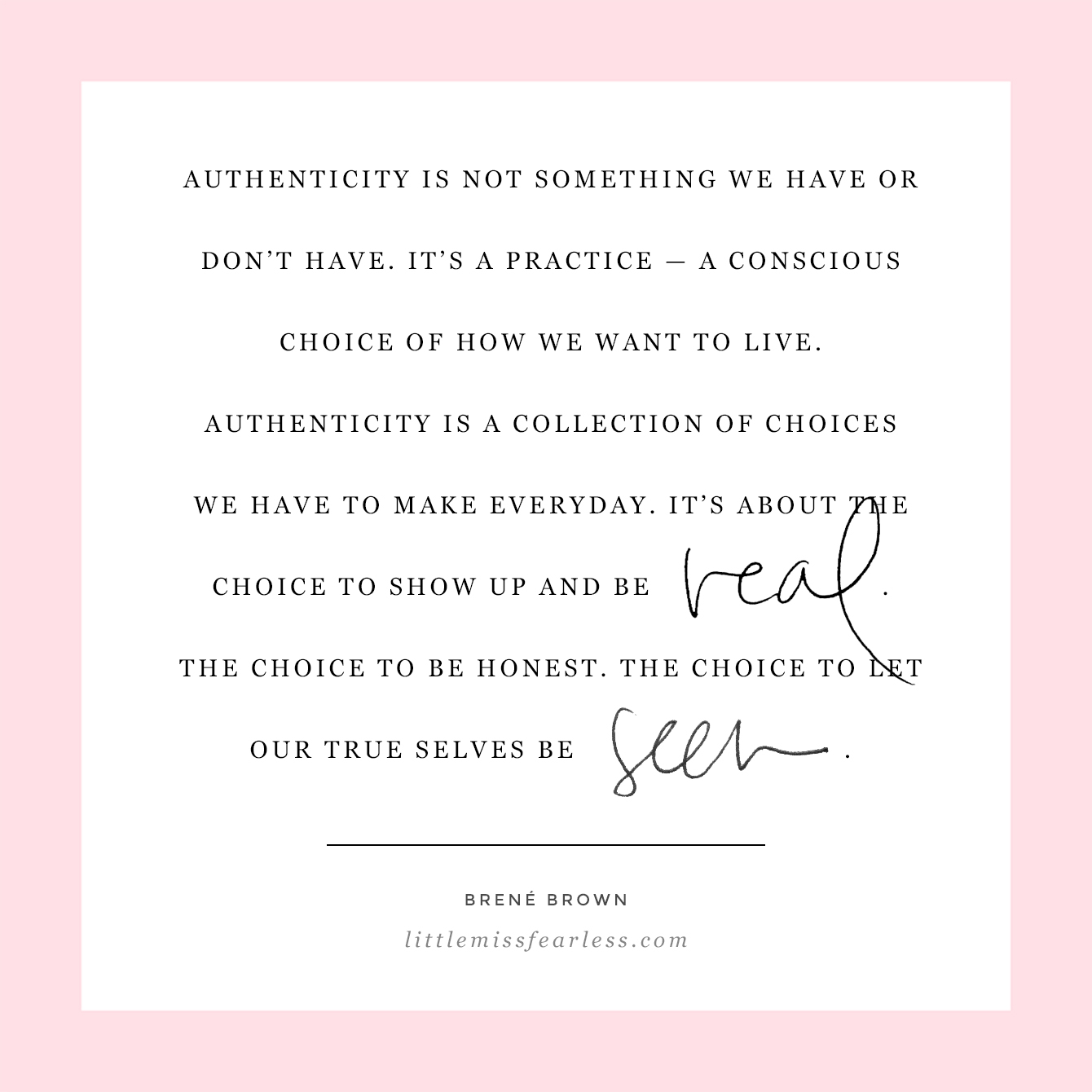
How do we find the courage to practice authenticity every day?
Brené Brown teaches that every time we enter an arena in our lives, we can bring an anthem in with us—a song (or selection of songs) that inspire us to take our armor off and let ourselves be seen by the people in the stands, even at the risk of criticism, vulnerability and shame.
Sometimes our inner critic is the loudest. When this happens, shame is driving two tapes:
- Who do you think you are?
- You are not enough.
To cope with this common internal narrative, I turn to my arena anthems for perspective. On days when I’m just down on myself and need help getting out of a scarcity mentality, I love songs like Colbie Caillat’s “Bubbly” or One Republic’s “Good Life” that take me back to the summer of 2007 when I lived in Maui and shortly after began dating Matt. I was so content with myself and where I was at that stage in my life. I still had dreams and things I hadn’t accomplished, but I was okay with what I lacked. And all I wanted was for everyone else in the world to be okay with where they were, too. I refer to this version of myself as “Maui Manda.”
I’ve shared with you how Blogging and Instagram are an arena for me. It still takes courage for me to be authentic in this space and let my true self be seen without giving in to my fears that to be accepted here, I need to look flawless, speak in perfectly witty, lighthearted and inspirational phrases, and act like I have my crap together. Sometimes I can genuinely say witty and inspiration things, other times, I just feel this overwhelming expectation to do everything perfectly.
My anthem for this space, and several of my arenas where the risk of shame is high, is HANDS DOWN “This Is Me” from The Greatest Showman. I shared a bit in my last post on authenticity, but if you haven’t seen the movie, PLEASE go see it. It is so powerful. I don’t want to spoil your experience, but you can also watch the clip of this song below. I can’t get enough!
What if we could change the world?
If we all got a little clearer on who we want to be, began living the values we claim, and choosing to be more authentic every day, don’t you think we could change the way the world views itself?
What is ugly would be beautiful. What is unpopular could be accepted. We could all live with our hearts and eyes wide open. With nothing but patience, understanding and acceptance for ourselves and for one another. We’d let go of what people think because we’d know that vulnerability is courage and that it’s contagious. We could live in a world that we design. 😉
As you think about your arenas and the kind of person you want to be, think about your arena anthem and please come share with me when you find one!
As always, I’d love to hear from you in the comments.

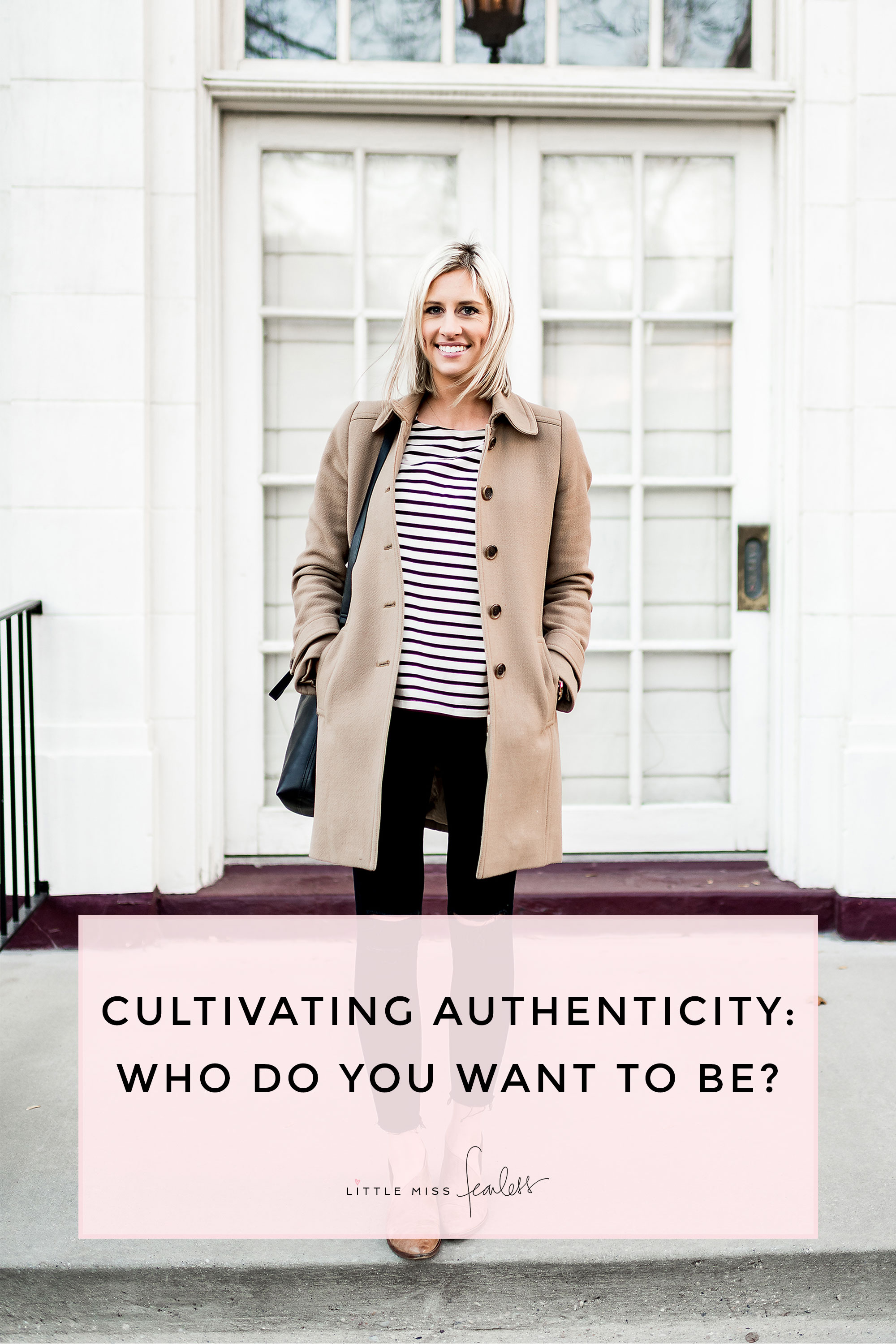
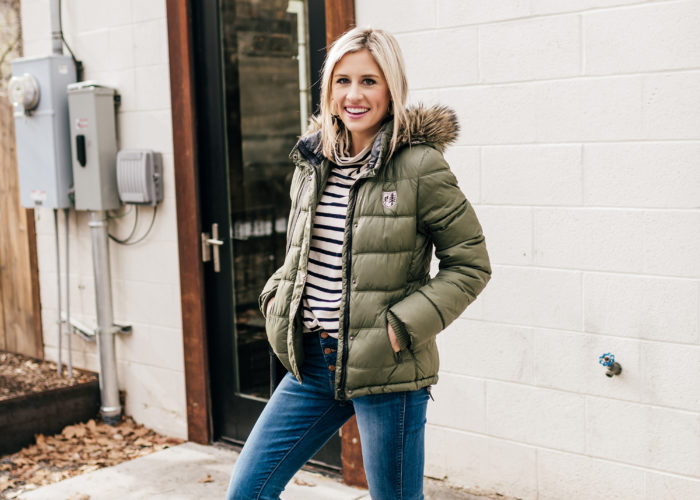



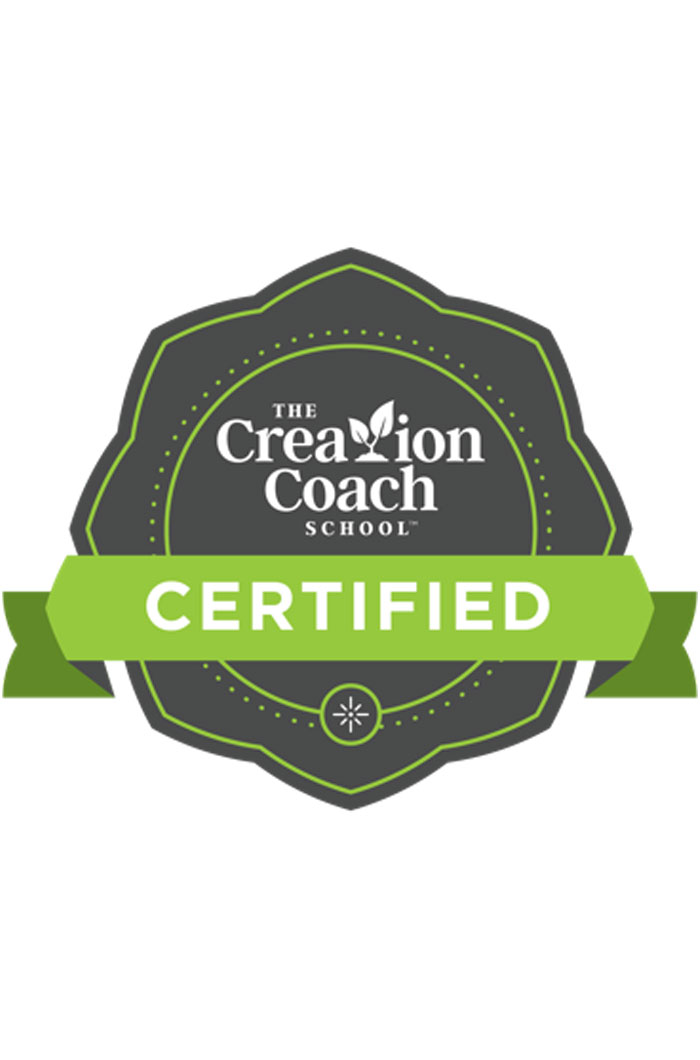

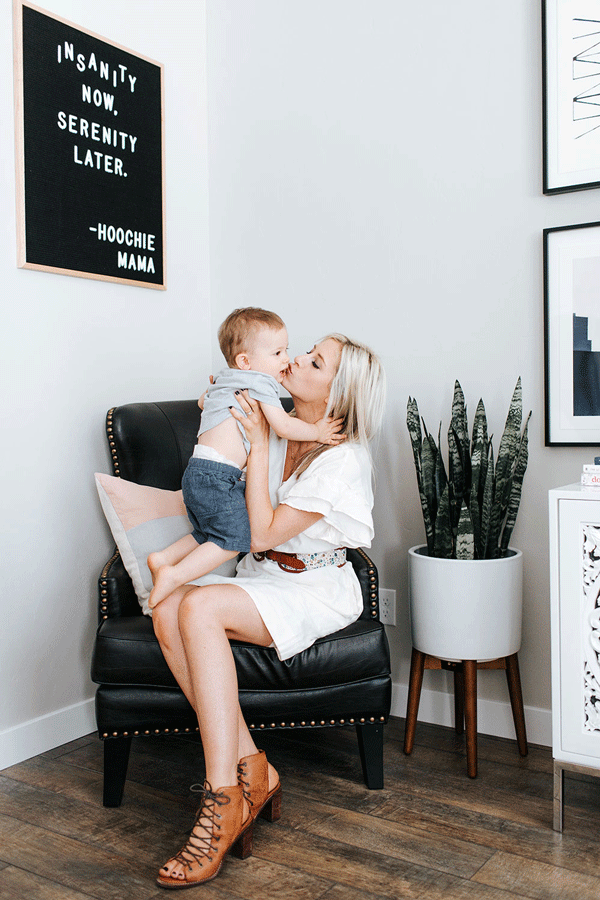
Amanda, I love your in-depth blog posts! ?
Definitely going to think of my own anthem, thanks for the inspiration, as always! ❤️❤️
Charmaine Ng | Architecture & Lifestyle Blog
http://charmainenyw.com
This is a great post. I’m going to be honest (and authentic) here: I don’t care for Brene Brown. I know. I’m like odd-man-out here. But I think authenticity is so important, particularly as I get older. I wish I’d been more honest about myself when I was younger; though I’m also aware that I wasn’t necessarily sure of myself when I was younger, so I’ll cut myself some slack there. As I move forward, however, I see that lack of authenticity leads to decisions not always in our best interest or long-term capacity. Basically, if we want to make good decisions for our lives, we have to be honest with who we are. Otherwise, we make decisions based on the ideas of others or to please others or to avoid certain pain, typically inflicted by others. Authenticity is literally the goal…which means the ride is long, bumpy and full of tributaries. 🙂
Wow Amanda you made some amazing points and you really have made me think a lot about authenticity and myself. I value authenticity but I also stay very surface level at some degree. Lately, I’ve been in the process of figuring out why I’m holding back. Girl you really got me thinking!
http://www.rdsobsessions.com
If we let go of what others would think of us and stop asking for acceptance, authenticity is easier to achieve. I think that’s why as I have gotten older I have realized the importance of armoring myself with people that have same beliefs and that truly listen to what I am saying. In today’s society it’s so easy to lose self because the values of today are not the same as of yesterday. I honestly feel and tell my hubby we are becoming obsolete because a lot of what we see doesn’t align with our own values and beliefs. But against all odds, we stay strong and don’t let the noise get in our head. We continue to march in life with our heads held up high because what we do have to say has value and what we do in this world has a benefit. Our willingness to let go of negativity and drama has had a tremendous effect on the quality of our life. The hardest for me has had to let go of people whom I thought were friends. Standing for my belief in how a friendship should be help me step up one notch to my own authenticity because I decided what didn’t work for me and decided to change it so that it aligned with who I am.
Maureen | http://www.littlemisscasual.com